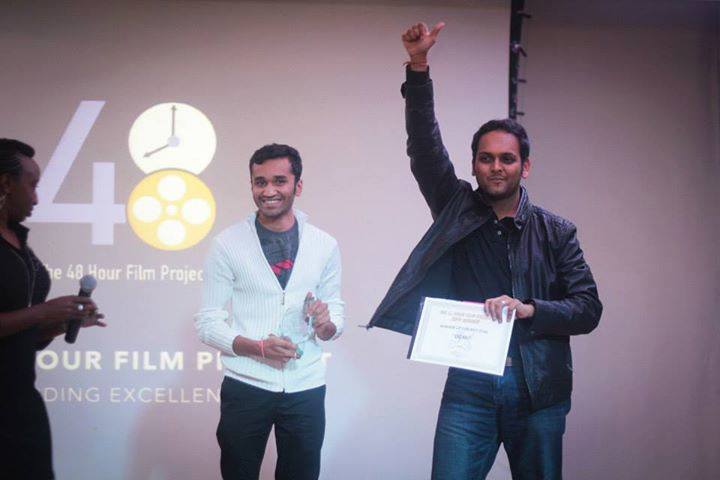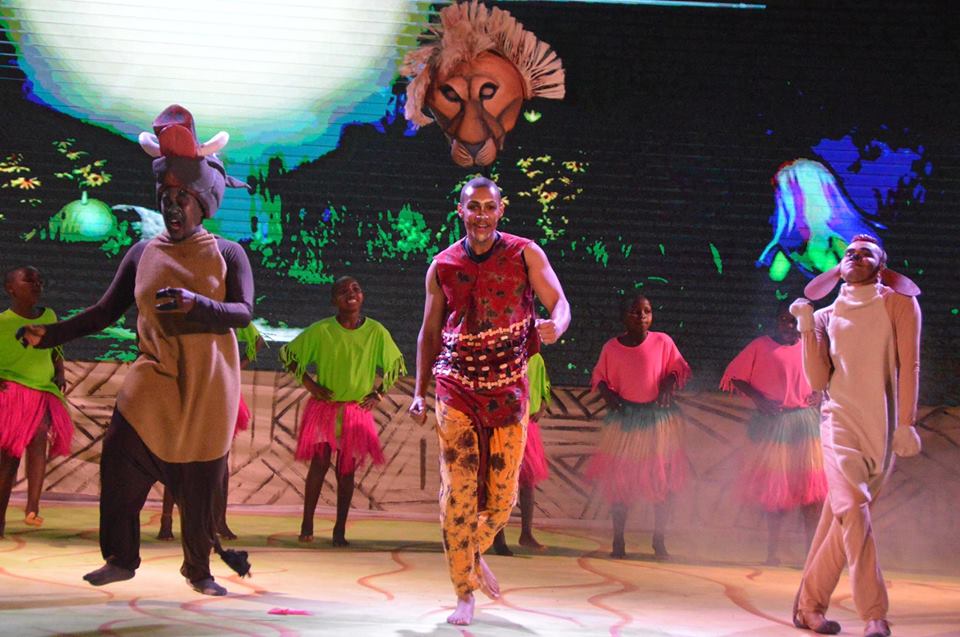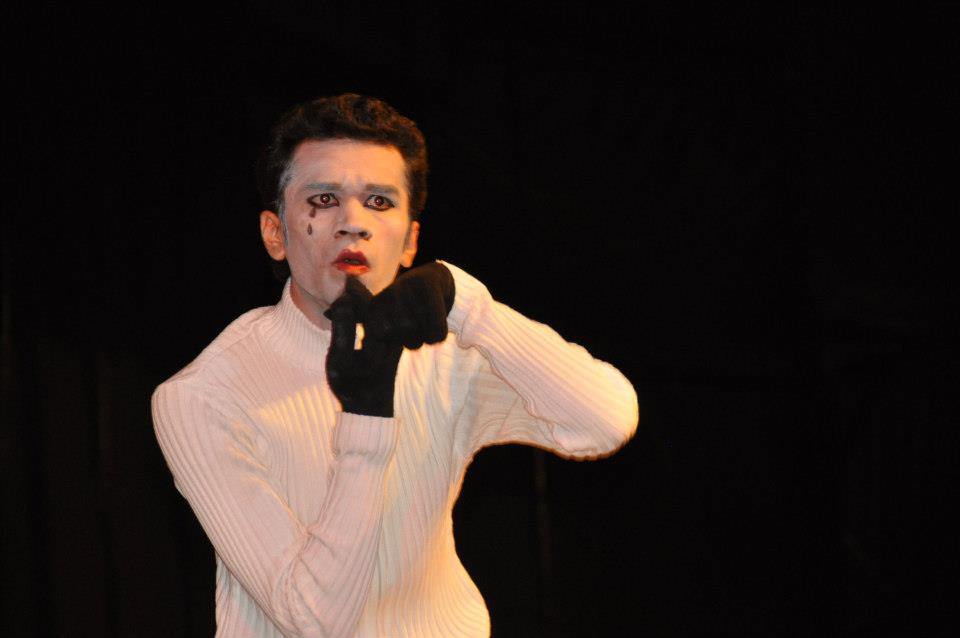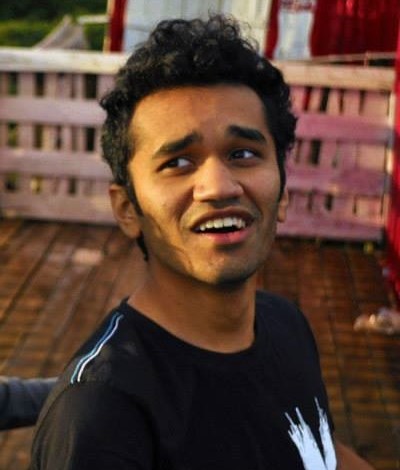Sahil Gada is a 24 year old film enthusiast together with friends and partners, Kunjan D and Hinal Thakkar, started a theatre company Hoodwink9 Theatre that is doing wonders in the theatre industry. None of them expected the company to grow into what it is today. Three years later, they have successfully produced two runs of the show Simba, an adaptation of the classic Lion King. This year they are taking it a notch higher with the production of Aladdin. His theatre journey has come with its challenges but according to him, each step has been worth it. Sahil talks to us about his passion, highlights of his career thus far and plans for the future.
1. You are producing another classic second year in a row how do you feel about that?
It is an intangible feeling to get to create classics. You recreate them in your own way and play with the characters. It’s surreal because this was not the initial plan. When I conceived the idea of the company it was more to do small scale heartfelt productions that would appeal to an audience. We started off with mythical Indian stories. Sometime last year we went through a couple of scripts to try and figure out what our next production should be. In a twist of fate or just how the universe works we were seating in Kujnan’s car and he told me of how they had gone to Disney and watched Broadway (Lion King). He managed to get the CD of the making of the stage, costumes the whole thing. So we watched it all the while in traffic and he had an epiphany of how we could do this here at home. Of course I thought it was crazy but the bone of contention was if Hinal says we do it then it is possible. We prepared a PowerPoint presentation to pitch to her and she said it was a tad too ambitious idea but we were going to do it.
2. Why was Hinal’s approval key for you?
At Hoodwink9 we are a trio. Kunjan, Hinal and myself. Until we are in tandem with one idea we cannot do it because we all want to give our best. Simba (Lion King), was a big step for us because we were a small company doing small things. It had to be on a certain budget and we were needed her sense of reason to see if we can actually do it.

Dentist Hinal Thakkar who is a choreographer and Director at Hoodwink 9 Theatre
3. Why the Lion King story?
It is a classic that has the emotions, the fight and win of good over evil. It has everything. I could see my own emotions coming through the story. We did it the first time and then we had another run and production value just kept going up.
4. What are some of the challenges you are facing as you look forward to put up this production, Aladdin, together?
Cables! We are trying to do something that we has not been done before. I love Kenya but it is almost impossible to get material to make the cables and skilled people to do it and operate them. We have had to import them that has taken almost five weeks

Sahil Gada and Kunjan D at the 48HOUR Project where thenAward for Best Film Nairobi – Runner Up – HK9 for “DZAV”
Another thing is most of our cast members are making their debut on stage in this production. This is where Simba and Aladdin are so different. In Simba, I used my networks and got seasoned actors and people knew what they are doing. Here there is a lot of oblivion and people just concentrating on their own roles. On a positive note this has offered me the luxury of molding the characters in the direction I want and then allow the cast to put in their flavour.

Scene from the musical Simba
The other one of course is the production costs. Hiring of the rehearsal space, the set, paying the team, costumes and all that. But we knew this going into production.
5. The issue of budgets cuts across for any production company, how have you resolved it?
We have quite a few sponsors and we hope that they like what they see. This is a business and if people are giving you money they expect you to give them something great in return. That’s where marketing comes in. So we give them ads and Kunjan handles all that. We are lucky to have our ads running in all Radio Africa stations so it has been a pull factor for the sponsors. This is a model that could work for our industry.
6. What scares you the most about this production?
The fact that we are doing live. We were judged a bit harshly for Simba because it was recorded and what people forget is one should take the experience and emotions from any piece of art and nothing else. It was our first production we had our challenges but we found a way to do it. It was difficult to achieve the greatness of the music of Simba on stage at the time. So that was a subtle introduction for our audience of what we can do and that prepared them for what they will experience in Aladdin.
7. So everything is live?
Yes. We might run into technical hitches but that is the risk of going live. But for sure much better experience than Simba.
8. Rate the theatre industry in Kenya.
4.
9. Why?
There are companies that are doing so much rubbish. I’ll give you an example we are putting up this show and it runs for three days. People say it should run for three weeks. First off, give us the money. Secondly, our budget is so high we are barely making any money and even that we are giving to charity. I am not blowing our own trumpet but I am so passionate about my craft. It’s insanely hard, it’s taxing. Art is not easy. It’s not about the money. If passion was top priority, this industry would do so much better.
10. How can it better?
People need to find stories that they want to tell. Tell your story. We have enough passionate people but the greed for money is pushing people to do mediocre stories which do not do anyone justice, the actors, audience and generally brings the industry down. Good example, last year we were nominated for the Sanaa awards, which are considered the Tony’s in Kenya, for Lion King. It was horribly organized, horribly done. The awards were useless. People were asked to vote for shows that they had not watched. That is the state of the industry. By the time the last winner was announced there were only five people. It was rubbish. Total waste of time. The system can be revived. If we are able to give incentives to motivate creatives. Just an appreciation for what we do, it would improve the whole thing. Once we do that the industry will attract investors who can put their marketing money in plays.
11. People still fill out the auditoriums to watch these shows?
You are really hungry. You go to a restaurant and the only have Ugali and chips on the menu. It’s a really isolated place and that is the only restaurant. So you try chips for the first time. It’s nice. Next time you try Ugali and you like it. The third, fourth, fifth and sixth time you get bored. But you still go there because you do get hungry. Your options are still Ugali and Chips. Now imagine if the restaurant increases its choices. So a theatre improves the quality of production, increases the number of genres they do and three more theatres come up. It increases competition which brings the quality up. Here we have many theatre companies we are just lacking competition so we lack in quality which leads to mediocre shows. People are hungry for good theatre but there are not many options.
12. There is an ongoing conversation of producers or production companies that are not paying actors, your thoughts?
We started off so well. Let me speak for theatre. When the late James Falkland started the Phoenix in 1983 actors we were well remunerated, what happened to that? Why did it drop? The only logical explanation was there was mismanagement of funds so the quality of plays went down. When that happened people who paid to watch the plays stopped coming. So now we are trying to come back up. We as a company are not paying people the amount of money we would like to pay them. But we have made it a policy to increase the pay with each production. Eventually we want to pay actors six figures. On the other hand actors need to have patience with the industry. Rome was not built in a day. We are all trying to get there.
13. The Phoenix Players Theatre is part of your foundation, tell me about that.
Falkland was my teacher in school at Oshwal Primary School. I did my first spoken role in stage when I was in class 7. There was always a murmur about a company he ran called Phoenix so I vowed to go work there. So we were doing Jack and the bean stalk pantomime in 2007 and I auditioned for Jack. Sadly he died before we started production. In the time I spent with him he instilled certain values in me for theatre. He is still my reference as I direct.

Sahil Gada on stage
Later I met a lady called Jenny. I told her of my interest to work at Phoenix and she explained the audition process for me. I went with my father to town to drop my audition forms and I got a call two weeks later for a role in a musical. This was my second time in town so the whole time I was auditioning all I was thinking about was how to get a matatu home. I panicked and blew the opportunity to play a main role and played a supporting role as a cop. I had three ambitions when I joined phoenix. Join the team, do a Shakespeare play and act with George Mungai. The first two happened after I pestered Temko Lavinda, TK, the then production manager to get me a role in the play. I had read about Shakespear so enacting the thee’s and thou’s was fun. It gave me such great exposure and taught me ethics. James Falkland and Phoenix made me the person I am today.
14. I am curious, why do it for Charity?
My career is in film not theatre. Theatre is my passion and maybe a hobby. No, it’s not a hobby. It requires too much dedication to be a hobby but I believe it will help me in filmmaking.
15. What’s the future for Sahil and Hoodwink9 in general?
I always wanted to have a theatre company and I have managed to do that. For now, I have given all that I can to theatre. I am working on a few scripts. The company is in good hands I am sure Kunjan and Hinal will do wonders with it.
16. That sounds like a goodbye.
I am not leaving just taking a break to do more film. Next year might be very silent for me because I intend on going back to school. I am sure the team will do a good job.
17. What can people expect from Aladdin?
Come and be spellbound. It’s big. It’s huge It’s an experience of a lifetime. The scary bits are really scary and the lovey bits are really lovey so it’s a good balance.
18. How much are the tickets going for?
Stalls 1500/- and 1000/- for the upper seating area.
19. That is relatively fair given the kind of show you are putting up why that price?
In the past theatre was for the elite and stuff. That was the origin of theatre. In the Shakespeare days the elite would sit at the top and the commoners sat in the balcony, the main area not knowing that itis had the best view. In Kenya we have gone through the phase of having it for the elite and our aim is to make it accessible to everyone. Everyone deserves quality entertainment. People expected our prices to go high but we were adamant about maintaining the ticket price because our aim is not to make money. We want to provide entertainment we are passionate about.
20. Last word?
The kids will have a lot of fun. We wanted to create something that both the children and adults can enjoy and so we have played a lot with the characters. The kids might not get it but the adults will. We have about the issue of equity in gender roles because female character are pivotal to the story. Watch the movie then come watch our rendition.
The Aladdin show goes down this weekend at the Oshwal Centre at the Auditorium and to get your tickets call 0700442337.
2nd September Friday – 7pm
3rd September Saturday – 7pm
4th September Sunday – 12pm and 7pm


